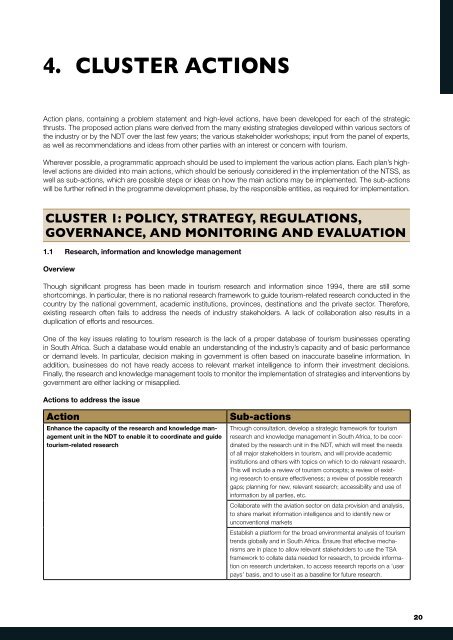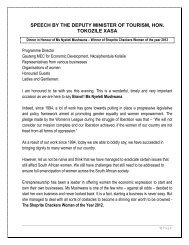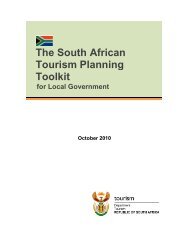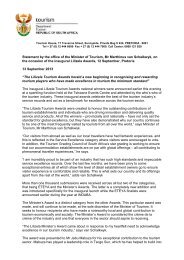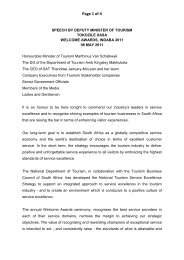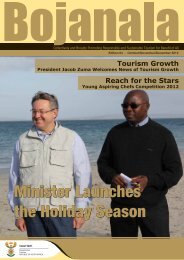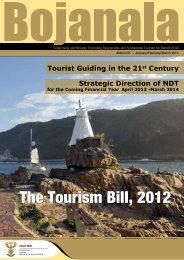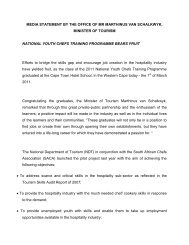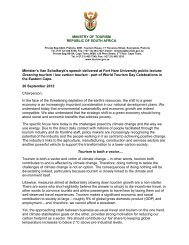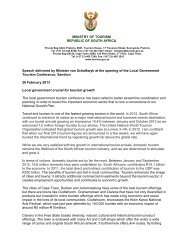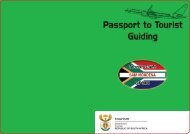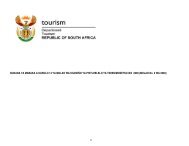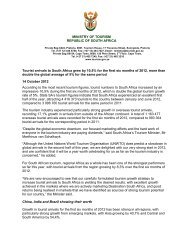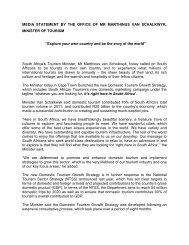National Tourism Sector Strategy - Department of Tourism
National Tourism Sector Strategy - Department of Tourism
National Tourism Sector Strategy - Department of Tourism
- No tags were found...
You also want an ePaper? Increase the reach of your titles
YUMPU automatically turns print PDFs into web optimized ePapers that Google loves.
4. Cluster actionsAction plans, containing a problem statement and high-level actions, have been developed for each <strong>of</strong> the strategicthrusts. The proposed action plans were derived from the many existing strategies developed within various sectors <strong>of</strong>the industry or by the NDT over the last few years; the various stakeholder workshops; input from the panel <strong>of</strong> experts,as well as recommendations and ideas from other parties with an interest or concern with tourism.Wherever possible, a programmatic approach should be used to implement the various action plans. Each plan’s highlevelactions are divided into main actions, which should be seriously considered in the implementation <strong>of</strong> the NTSS, aswell as sub-actions, which are possible steps or ideas on how the main actions may be implemented. The sub-actionswill be further refined in the programme development phase, by the responsible entities, as required for implementation.CLUSTER 1: Policy, strategy, regulations,governance, and monitoring and evaluation1.1 Research, information and knowledge managementOverviewThough significant progress has been made in tourism research and information since 1994, there are still someshortcomings. In particular, there is no national research framework to guide tourism-related research conducted in thecountry by the national government, academic institutions, provinces, destinations and the private sector. Therefore,existing research <strong>of</strong>ten fails to address the needs <strong>of</strong> industry stakeholders. A lack <strong>of</strong> collaboration also results in aduplication <strong>of</strong> efforts and resources.One <strong>of</strong> the key issues relating to tourism research is the lack <strong>of</strong> a proper database <strong>of</strong> tourism businesses operatingin South Africa. Such a database would enable an understanding <strong>of</strong> the industry’s capacity and <strong>of</strong> basic performanceor demand levels. In particular, decision making in government is <strong>of</strong>ten based on inaccurate baseline information. Inaddition, businesses do not have ready access to relevant market intelligence to inform their investment decisions.Finally, the research and knowledge management tools to monitor the implementation <strong>of</strong> strategies and interventions bygovernment are either lacking or misapplied.Actions to address the issueActionEnhance the capacity <strong>of</strong> the research and knowledge managementunit in the NDT to enable it to coordinate and guidetourism-related researchSub-actionsThrough consultation, develop a strategic framework for tourismresearch and knowledge management in South Africa, to be coordinatedby the research unit in the NDT, which will meet the needs<strong>of</strong> all major stakeholders in tourism, and will provide academicinstitutions and others with topics on which to do relevant research.This will include a review <strong>of</strong> tourism concepts; a review <strong>of</strong> existingresearch to ensure effectiveness; a review <strong>of</strong> possible researchgaps; planning for new, relevant research; accessibility and use <strong>of</strong>information by all parties, etc.Collaborate with the aviation sector on data provision and analysis,to share market information intelligence and to identify new orunconventional marketsEstablish a platform for the broad environmental analysis <strong>of</strong> tourismtrends globally and in South Africa. Ensure that effective mechanismsare in place to allow relevant stakeholders to use the TSAframework to collate data needed for research, to provide informationon research undertaken, to access research reports on a ‘userpays’ basis, and to use it as a baseline for future research.20


